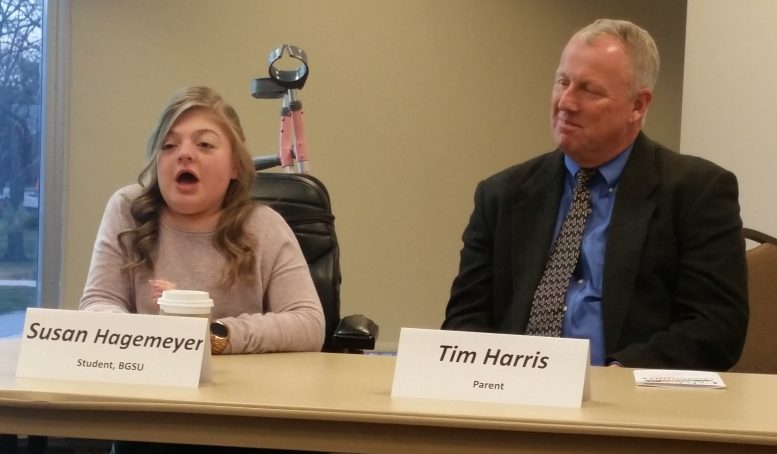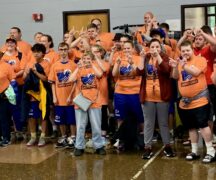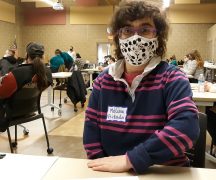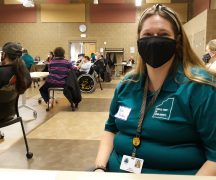By JAN LARSON McLAUGHLIN
BG Independent News
Labels can be so limiting – especially if they are placed on people early in their lives.
“Labels belong on jelly jars They don’t belong on people,” said Emily Dunipace, of Wood County Board of Developmental Disabilities, also known as Wood Lane.
But yet, people with developmental difficulties are often given diagnoses that focus on the disabilities – ignoring the abilities. A panel of experts on the issue gathered recently for a community conversation on how humans often jump to conclusions on the limitations of people with disabilities.
Susan Hagemeyer, a Bowling Green State University student, knows all about low expectations imposed on people who are different. She was born with a rare bone disease, is small in stature, and uses a wheelchair or crutches.
“I was that kid who didn’t have a chance to make it to my first birthday,” Hagemeyer said.
Her physicians said she would never walk, and her step-dad said she would never make it to college
“My mom never gave up hope,” Hagemeyer said.
Despite the labels and low expectations, Hagemeyer is a third-year student at BGSU.
“I never thought I’d be where I am right now,” she said. “I’m the happiest I’ve ever been.”
Hagemeyer and others on the panel said people need to be supportive, not judgmental.
“I am a normal human being,” she said. “I don’t need to be fixed.”
Mark Foster, who uses some services from the Wood County Board of Developmental Disabilities, knows exactly what Hagemeyer is talking about.
But Foster expressed some sympathy for physicians who diagnose developmental disabilities. “Doctors only know how to tell you the bad, because they don’t know what the good is,” he said. Physicians are trained to solve problems. “That’s all they know.”
Parents put their faith in doctors, and believe in the prognoses they assign to children with disabilities, Foster said. In the early 1990s, when Foster became an adult, his parents dismissed the idea that he could live independently in an apartment.
“You watch and see,” he remembered telling his parents. “I did it. My parents were proud that I did it.”
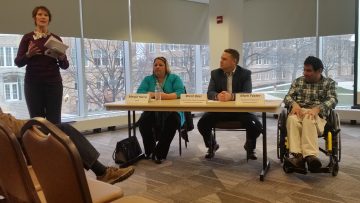
Emily Dunipace introduced topic for panel, including Margie Harris, Brent Baer and Mark Foster.
The panel also included parents who worked to make sure their children had the most opportunities available to them.
Tim and Margie Harris talked about their daughter Libby, who was born with significant medical issues and developmental delays. Libby turns 21 this month, and has attended Wood Lane for 18 years.
“That always made Libby the best she could be,” Tim Harris said.
“They saw the possibilities in Libby,” Margie Harris said
Margie Harris recalled taking Libby to a hockey camp for her siblings in New York. The family found the community much less welcoming than Bowling Green for Libby.
“People were not as accepting,” she said. “This is her community, too.”
Parent Brittany Joseph talked about her son who has autism. When he was first diagnosed, she sought help and advice.
“I wanted him to get every support possible,” she said. “So he can do everything his peers are doing.”
But later, Joseph realized that her son didn’t need fixing.
“I don’t want him to be like everyone else. I want him to be him,” she said.
That doesn’t mean Joseph has low expectations for her son. She prides herself on being a “feisty mom.”
“I’m always tirelessly advocating for my son,” she said.
As part of the community conversation, a TED talk video was shown, focusing on the mother of a daughter with a rare chromosomal syndrome.
“She wasn’t designed to be like other people,” the mother said. And once she let go of the “good” and “bad” labels, “I could watch my daughter’s life unfold.”
While the experts’ goal was to make Fiona “normal,” her mom wanted to make Fiona as independent as possible.
“My kid is human. That’s all, and that is a lot.”
Also on the panel was Brent Baer, Wood Lane superintendent. When parents first find out their child has a developmental disability, they are flooded with information. So Wood Lane makes sure to do more than offer advice.
“Our initial job is to shut up and listen,” he said.
Baer talked about the “rollercoaster ride our families are on.”
When they initially receive a diagnosis, some parents have trouble accepting the information.
“As a parent, you go through a grieving process,” Margie Harris said.

